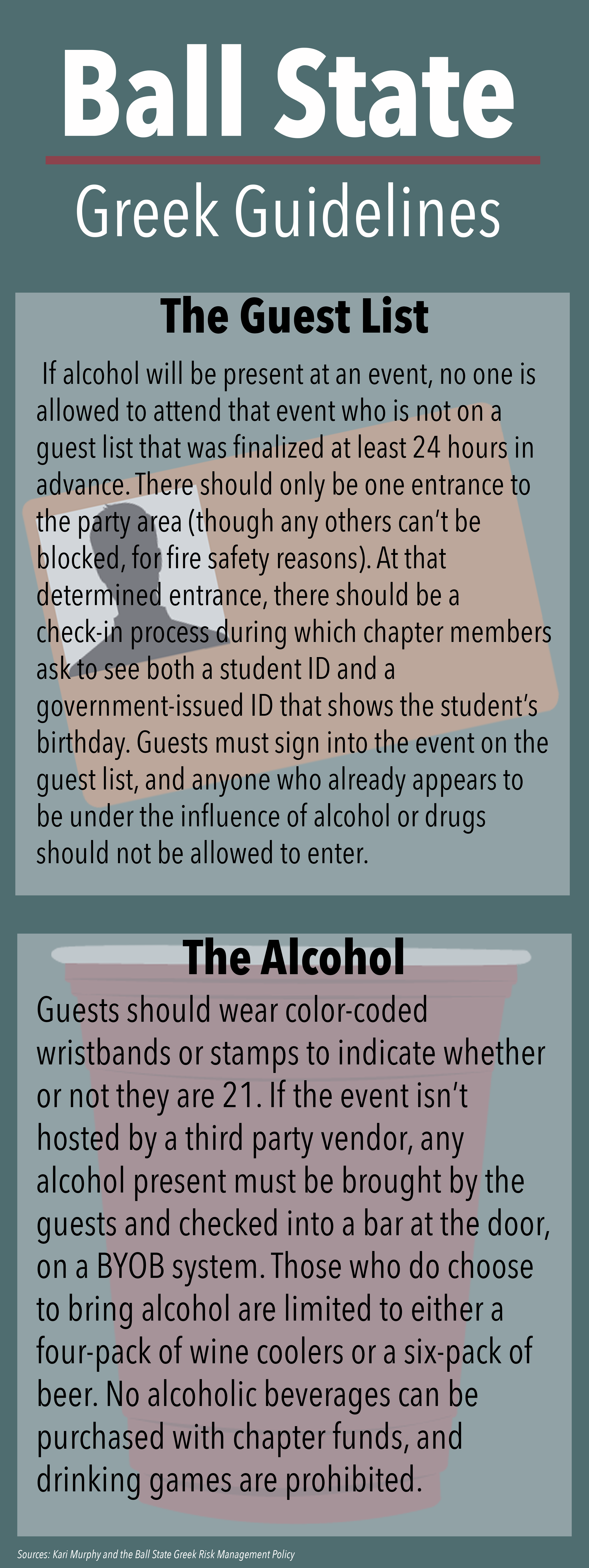After the end of a pause to social events for most Ball State University fraternities, members look for the best ways to move forward.
On Oct. 24, 2017, officials at Ball State University called together a meeting with presidents from each of the 13 Interfraternity Council (IFC) chapters on campus. Kari Murphy, the director of Greek Life, and the other officials there told the group it was time to solve a problem.
Throughout the spring and fall semesters of 2017, the IFC organizations had displayed a pattern of behavior university authorities described as “unacceptable.” According to an email statement from Ball State’s Division of Student Affairs and Enrollment Services, the Office of Greek Life filed 51 reports related to alcohol, fighting, hazing, excessive noise, or sexual misconduct between Aug. 1 and Oct. 23.
Trevor Holland, who was president of the IFC at the time, says excessive alcohol consumption and rowdiness had been causing more hospital visits during Greek activities. Friction between some of the fraternities had also ended in fights at a few of the parties.
Murphy says some of the ongoing concerns included noise complaints to the University Police Department and the increased number of events happening several nights a week, not limited to weekends.
The meeting, which took place a couple days after Ball State’s homecoming, was not motivated by any specific incident or weekend. But during homecoming, the pattern of behavior that had emerged moved from fraternity houses to the tailgating fields, and that visibility contributed to a decision that change needed to happen.
Trevor says he and other Greek leaders had seen the fraternities from other schools across the country making headlines for the deaths taking place at their parties. He didn’t want that to be what Ball State turned into.
“We’re not that community, and we know we’re not,” Trevor says. “The Ball State Greek community is a community of values, and we know that. This was an opportunity to challenge that.”
The meeting included a discussion about the future of fraternity life at Ball State before university officials left the room, so fraternity members could discuss the issue alone.
The vote was unanimous: The 13 IFC fraternities would pause all social events—with or without alcohol—for three months.
At least seven other American universities took similar measures in the fall of 2017, halting some or all Greek Life activities for varying amounts of time. Several of these actions took place following deaths related to hazing or alcohol abuse within fraternity settings, and others, like Ball State, were due more to patterns of general misconduct. Hank Nuwer, a journalism professor at Franklin College known for his writing about hazing, says actions like social pauses and limitations for Greek organizations have never happened before to this extent.
The pause at Ball State was not an easy decision, Trevor says. Those in charge of Greek Life would not have done this if it wasn’t for the overall good and safety of the IFC. They try to give each organization as much autonomy as possible, within the guidelines of Ball State’s Greek Risk Management policy.
While all the IFC fraternity presidents agreed to the social pause, reactions to the decision varied widely across the rest of the Greek community. Trevor, a public relations major at Ball State, thinks this was due to a lack of control leaders had over the narratives that spread after the meeting. People both within and outside of the Greek community heard “social pause” without really understanding what that meant. As word traveled, many interpreted the action as a punishment or a ban on fraternities.
Trevor mostly saw fraternity members express confusion. But some people showed frustration with Trevor through social media, even though he didn’t have a vote. He represents the fraternities as a whole but is not the president of his own fraternity, Lambda Chi Alpha.
Trevor says when fraternities were first founded, they weren’t meant for drinking or status.
“The purpose was to hold yourself to a higher standard,” Trevor says. “Brotherhood, doing service, being part of a community, and just taking that step to say, ‘I’m holding myself to these values and to this way of life’—that’s how I view fraternity.”
He joined Greek Life because he wanted to grow as a student, leader, and person. His involvement gives him an additional purpose at Ball State besides going to class. It pushes him to live with integrity.
Murphy says members in the Greek community learn about philanthropy and giving back. They also learn leadership skills, as managing a fraternity or sorority chapter can be like managing a small business. She says Greek organizations are microcosms of everything that’s going on at the university.
“Greek Life is really a one-stop shop in getting involved, both on campus as well as in the community,” Murphy says.
Greek Life began as a way to provide students with an intellectual environment that was different from their classes, Nuwer says. But now things are changing. Due to the party atmosphere, Nuwer says some Greek communities in the United States have become like underground clubhouses for underage drinkers.
And while Trevor says hazing isn’t much of an issue at Ball State, it has led to deaths at other schools. Nuwer says hazing happens in part because alumni encourage it under the idea of maintaining a status quo. Nuwer respects tradition, but he says illegal activities do not constitute tradition.
Hazing itself hasn’t necessarily gotten worse over time, Nuwer says, but it’s starting to involve a lot more alcohol.
According to a study published by The National Center for Biotechnology Information, members of social fraternities and sororities are significantly more likely than other college students to participate in risky alcohol consumption behaviors and to experience the related consequences, such as sexual misconduct.
Mellisa Holtzman, a sociology professor at Ball State who helped design a sexual assault protection program called Elemental that has spread to schools across the country, says alcohol is the most common date rape drug. Most parties where sexual assaults occur also involve a lot of alcohol, she says, and fraternities might enforce a kind of masculinity that is associated with dominance.
While inconsistent reporting of sexual assaults can make it difficult to say how prevalent the issue is within fraternities and whether overall rates have changed over time, Trevor believes the definite shift has been in how universities are responding.
Trevor, who hopes to attend grad school for student affairs and higher education, says fraternities constantly evolve along with universities as a whole. Higher education has recently seen a big push on safety in general, and sexual assault prevention has become more widespread for all college students. Trends in higher education directly affect fraternities, so Trevor believes it makes sense for there to be more promotion of safety in Greek events.
“Greek Life is just a smaller section of campus,” Trevor says. “It’s the same people, just zoomed in a little bit.”
Nuwer says the recent actions aren’t necessarily due to a higher rate of deaths and injuries during fraternity events, but more that the recent deaths were high-profile. These headline-making cases generated a greater motivation to do something about alcohol abuse and hazing within fraternities, Nuwer says, and the #MeToo movement led to more awareness of sexual assault.
But the main thing that’s different now is the success of lawsuits against universities, Greek advisors, and fraternities where serious incidents have occured due to extreme negligent behavior. These kinds of lawsuits aren’t new, but Nuwer says the cases from a few decades ago almost never succeeded. Now, laws and public opinions have shifted, and lawyers have figured out more effective strategies.
“It doesn’t take the best attorney to win these cases,” Nuwer says.
Upon winning lawsuits, the parents of students who were injured or killed in fraternity-related situations usually receive considerably large compensations, so Nuwer says more universities are working to change party and fraternity culture.
At Ball State, the measure to halt social gatherings was preventative. It wasn’t a punishment, Murphy says, but a reflection time for the men and women in Greek Life. At the time, there weren’t many other schools in the same position of experiencing a pattern of bad behavior without any extremely severe incidents. There was no trend to follow in deciding what to do, so Ball State helped set an example.
In fact, shortly after the social pause began at Ball State, Murphy received a phone call from someone at the University of Michigan asking for advice on how to implement a similar measure. They talked for a while, and Murphy saw the Michigan school start a social pause within the next few days.
The social pause at Ball State, which lasted 100 days, replaced parties with mandatory workshops on topics such as alcohol safety and bystander intervention. While responses to the trainings varied some among chapters, Murphy says all the fraternities did end up having at least 90 percent of their members complete the trainings.
Trevor says more chapter members understand they can do things with their fraternity brothers that don’t involve alcohol.
“During the pause, we were back to the basics of fraternity,” Trevor says.
In his own fraternity, Trevor says people speak differently about alcohol or notice problematic situations right away, stopping them before they continue into anything worse. The bystander intervention trainings called it a “green dot” when someone intervenes and does something to prevent dangerous behavior. A “red dot” is when they don’t. Trevor has seen a rise in the number of fraternity members using these terms. Even if they do so jokingly or sarcastically, Trevor is happy to see the training is still at the top of their minds.

Murphy says a lot of the IFC chapters have seen this kind of shift in culture, embracing the educational opportunities and requesting that new members be able to complete the trainings as well, in an annual and ongoing discussion. The alcohol training has also expanded to women’s groups.
The number of noise complaints has declined since the pause lifted on Jan. 31, and there has been a decrease in the overall number of events and issues compared to before the pause, Murphy says.
This could be partially due to the normal differences between fall and spring semester patterns. It’s not football season anymore, and students aren’t new to campus and the freedom of college. Still, though, Murphy says this spring has been better than last spring. During the social pause, there were no complaints regarding alcohol, hazing, or sexual assault within the fraternities.
Trevor sees hope in some fraternities changing guidelines so that the new member process can’t last more than a few weeks. There is a power dynamic during the new member process, whether it’s intended by the older members or not. Trevor’s fraternity doesn’t haze their members, he says, but there doesn’t have to be hazing for this environment to exist. New members just feel an overwhelming sense of wanting to belong, so they’ll feel pressured to please everyone and do whatever they need to do to be liked. Trevor says older members need to be aware of that, and shortening the new member period helps reduce that power dynamic. Nuwer agrees, saying shorter pledge periods would lead to more positive change in fraternities across the country.
In his 40 years of studying fraternities and hazing, Nuwer has never seen so much anti-Greek sentiment from students, graduates, and parents. Trevor agrees, saying a lot of people right now are questioning the future of fraternity. But that’s exactly why Ball State took these measures.
While Murphy says the Greek community at Ball State feels the social pause and additional education was promising, Nuwer doesn’t know if these kinds of actions will cause any long-term benefits. It’s going to take a lot to change alcohol culture, he says. Dry houses would be a start, if enforced.
Holtzman says universities have been fighting the battle against alcohol abuse and sexual assault for a long time and haven’t made much of a dent. She also believes it will take more than social pauses to change alcohol culture on college campuses, and that such measures should just be one part of a broader, multi-faceted approach.




